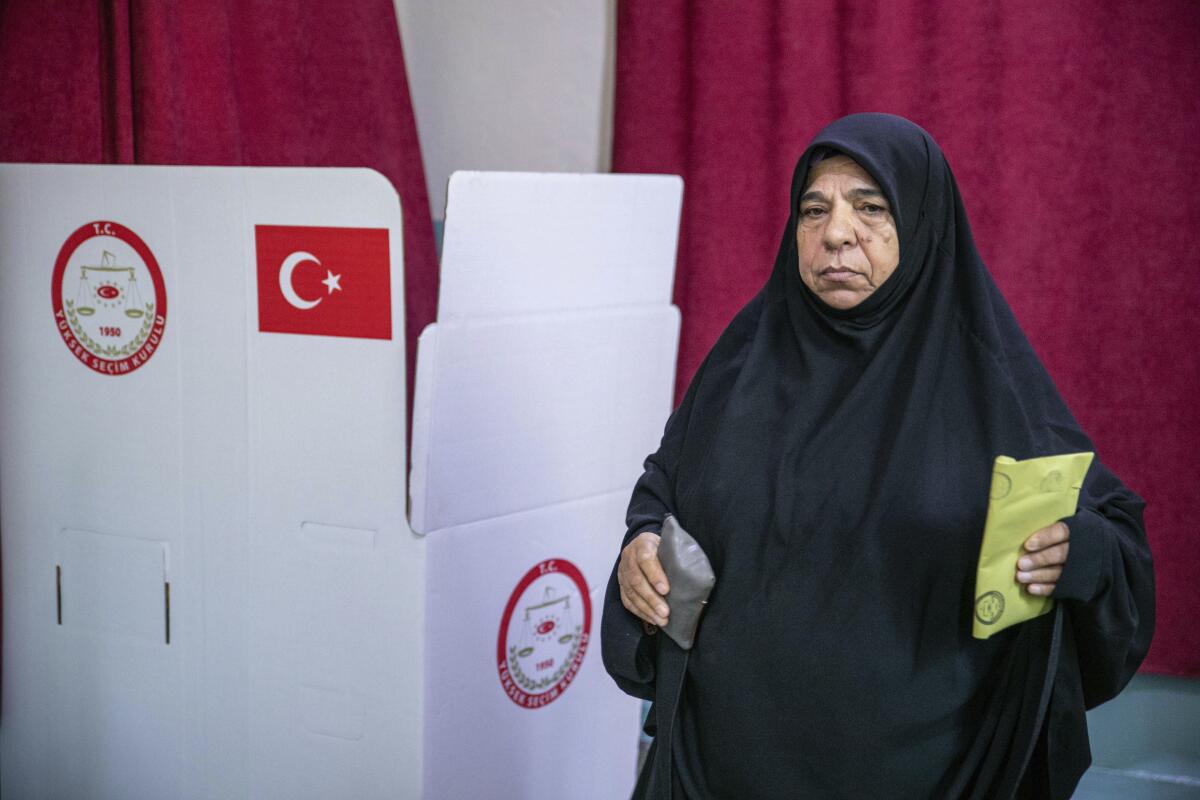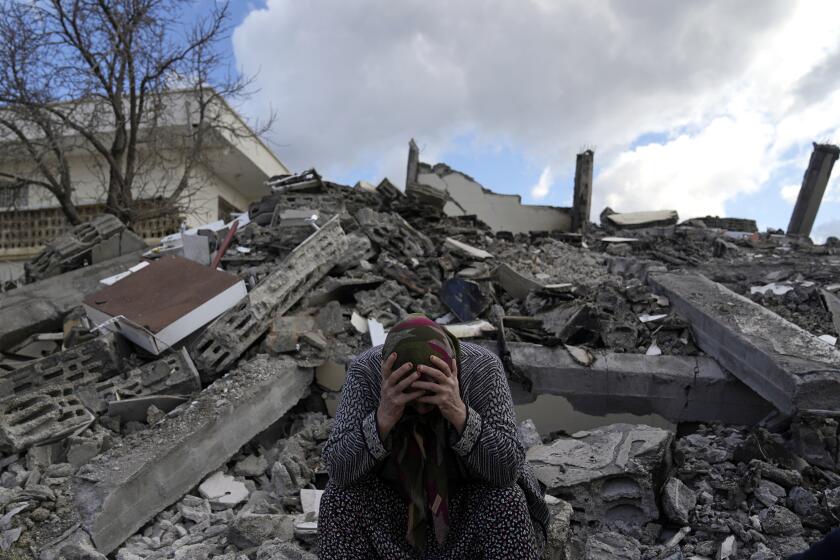Turkey heads to a May 28 runoff as Erdogan falls short of outright reelection

- Share via
BEIRUT — Turkey will go to a presidential runoff after neither leading candidate was able to secure a majority in an election that many of their compatriots see as nothing less than a referendum on the country’s identity as well as the course it will chart in its relationships within the Middle East, Europe, NATO and beyond.
With only about 35,000 ballots left to be counted — on an 88% voter turnout — the head of Turkey’s High Election Board told a news conference Monday that neither President Recep Tayyip Erdogan nor his main challenger, Kemal Kilicdaroglu, was able to reach the 50% threshold to win outright, meaning that the country will have a runoff in two weeks, on May 28. Erdogan garnered 49.51% of the vote versus 44.88% for the opposition leader.
A third candidate, Sinan Ogan, who is backed by a right-wing alliance, had 5.28% of the vote. In an interview with the German DPA news agency, Ogan said he would have “preconditions” for any candidate who wanted his support ahead of the runoff.
Speaking to supporters in Ankara, Erdogan, 69, said Sunday he would respect the nation’s decision if the race went to a runoff vote — the first in the country’s history.
“We don’t yet know if the elections ended in the first round. ... If our nation has chosen for a second round, that is also welcome,” Erdogan said early Monday.
After the results were announced, Kilicdaroglu, 74, the candidate of a six-party opposition alliance, urged supporters “not to fall into despair.”
“We will stand up and take this election together,” he tweeted.
But the result is bound to be a disappointment for the opposition coalition, which had gone into the election expecting a win that would demonstrate fatigue with Erdogan and his brand of personality-driven economics. Instead, the outcome appears to have shown Erdogan’s staying power and the sway he still holds over the electorate in spite of a drastically weakened economy.
Erdogan is seeking a third five-year term that would cement his dominance over the country of about 85 million people. He faces a coalition of opposition parties that have mounted the greatest challenge of his lengthy political career.
Sources in Russia have reported that two fighter planes and two military Mi-8 helicopters crashed in the Bryansk region bordering Ukraine on Saturday.
Overnight, the opposition cast doubt on the state agency’s tally, accusing it of manipulating results in Erdogan’s favor. Istanbul Mayor Ekrem Imamoglu, a stalwart of the Republican People’s Party, said in a statement that the agency’s reputation is “below zero” and that according to his party’s data, Kilicdaroglu was winning. Kilicdaroglu first tweeted, “We are ahead,” then, after Erdogan fell below the 50% threshold, called on ballot observers to continue their work.
Later, Kilicdaroglu accused Erdogan’s camp of obstructing the system by objecting to results from certain ballot boxes, according to a report from Qatari news broadcaster Al Jazeera.
“There are ballot boxes that have been objected to six times, 11 times,” he said, adding, “You are blocking the will of Turkey.”
“You cannot prevent what will happen through objections. We will not allow a fait accompli.”
Erdogan, meanwhile, said on Twitter that “trying to announce results hastily means usurpation of the national will.”
As the campaign proceeded, Erdogan faced widespread anger over economic policies that have pummeled Turkish households and seen inflation rocket up to 80% last year. It now stands at 44%.
But paramount in people’s minds have been the cataclysmic earthquakes this year that caused more than 60,000 deaths, bringing widespread criticism of a lethargic government rescue response and lax enforcement of building codes that could have reduced the destruction. Opinion polls in the run-up to the election consistently predicted a win for Kilicdaroglu.
Perhaps sensing that vulnerability, Erdogan had in recent months created a sort of election economy, announcing a large salary hike for about 700,000 public workers, raising pensions along with the minimum wage, setting up low-income housing projects — even promising that the windfall from new natural gas reserves in the Black Sea would be used to give Turkish citizens free gas for their homes for a month and reduced rates for a year. He wielded state media in his favor, with analysis from the opposition claiming Erdogan got 32 hours of coverage in April versus 32 minutes for Kilicdaroglu.
He also took on a relentlessly nationalist bent, demonizing the opposition as terrorists in cahoots with Turkey’s enemies in the West while boasting of economic and military-industrial development under his stewardship.
Arrayed against Erdogan was a coalition comprising six opposition parties, all backing Kilicdaroglu, a taciturn politician many would describe as the antithesis of Erdogan. He leaned into a down-home style for his videos, addressing voters from his kitchen — a tea kettle in the background — in a calm oratory style a universe away from the president’s bombastic persona. A member of the minority Alevi sect, he espouses a more secular line than his opponent: His final campaign stop before the vote was to the mausoleum of Mustafa Kemal Ataturk, the founder of modern Turkey, in Ankara; Erdogan held his in the Hagia Sophia mosque in Istanbul.
“If Erdogan is a populist rallying his base by brutalizing opponents and suggesting this is how politics are done, Kilicdaroglu is all about reaching across the aisle, and asking for forgiveness for injustices by his party,” said Soner Cagaptay, who heads the Turkish Research Program at the Washington Institute for Near East Policy.
“He’s the opposite of Erdogan. And that has worked.”
Central to Kilicdaroglu’s platform as the anti-Erdogan was his promise to curtail presidential powers if he won, returning the country to a parliamentary system and restoring the independence of the judiciary and the central bank — in other words, a full reversal of Erdogan’s transformation of the Turkish state over the last few years. Kilicdaroglu has said he would serve for only one term.
The election saw a high turnout, with most of the 64 million people eligible to vote participating in both presidential and parliamentary elections, with the latter sending representatives to the country’s 600-seat parliament. Final results are expected Monday, but so far Erdogan’s Justice and Development Party was projected to garner about 270 seats, according to state media. A win would enable him to double down on his policies in the judiciary, central bank and Foreign Ministry — all institutions whose independence has been hollowed out by Erdogan, critics say.
The race has been closely watched abroad, especially in the West, where Erdogan has the reputation of being an irksome ally, delaying Finland’s membership bid in the North Atlantic Treaty Organization and snarling Sweden’s unless it gave up Kurdish refugees in the country whom Ankara considers terrorists. Europe’s leaders have largely abandoned the idea of Turkey joining the European Union. Erdogan also has frustrated Washington by refusing to join the sanctions regime against Russia for its invasion of Ukraine, offering a lifeline to the Kremlin even as he sold drones to Kyiv. In his last campaign speech, he accused President Biden of working with the opposition to topple him.
“I know this. All my people know this,” he said. “If that is the case, then the ballots tomorrow will give a response to Biden too.”
Polls show Turkish President Recep Tayyip Erdogan facing the toughest reelection race of his career as the country prepares for an election Sunday.
Henri J. Barkey, an expert on Turkey formerly at the U.S. State Department who has clashed with the Erdogan government, said a new administration led by Kilicdaroglu and the opposition would retire much of the anti-U.S. rhetoric that Erdogan has favored of late and would probably quickly unblock Sweden’s access to NATO.
But even a returning Erdogan government, he said, would be forced to soften some of its positions because of its dire need for economic relief and better access to global markets. “Erdogan is good at turning on a dime,” Barkey said.
Of greater concern, commentators say, is Erdogan’s turn to authoritarianism. Some wonder whether he will respect the result. Dennis Ross, a retired U.S. diplomat, said Erdogan will be “sorely tempted” to ignore anything that shows him losing but that Turkish tradition in democracy will make that difficult.
“If Erdogan ends up winning, pretty much you know he’s president for life,” he said in a videoconference Sunday at the Washington-based Center for the National Interest, a conservative think tank.
In a nationally televised interview Friday, Erdogan dismissed questions on whether he would honor the results as “silly.”
“Just as we came to power with the favor of our people, that is, if our nation makes a different decision, we will do exactly that, whatever the necessity of democracy,” he said. “There is nothing else to do.”
Times staff writer Tracy Wilkinson in Washington contributed to this report.
More to Read
Sign up for Essential California
The most important California stories and recommendations in your inbox every morning.
You may occasionally receive promotional content from the Los Angeles Times.














